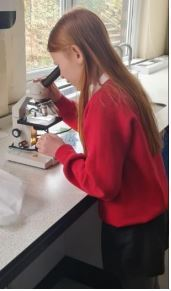
Science
Intent
Science Skills and Knowledge Progression
Science KS1 and KS2 Long Term Curriculum Plan
At St. Michael’s School, it is our intent to encourage children to be inquisitive throughout their time at the school and beyond. Our Science curriculum fosters a healthy curiosity in children about our universe and promotes respect for the living and non-living. We believe science encompasses the acquisition of knowledge, concepts, skills and positive attitudes. Throughout our rolling programmes of study, two years in key stage one and four years in key stage two, the children will acquire and develop the key knowledge and vocabulary that has been identified within each unit and across each year group, as well as the application of scientific skills. We ensure that the Working Scientifically skills are built-on and developed throughout children’s time at St. Michael’s so that they can apply their knowledge of science when using equipment, conducting experiments, building arguments and explaining concepts confidently and continue to ask questions and be curious about their surroundings.
Children will also learn about a range of different scientists from around the world and the contributions that they have made to the scientific world.
Implementation
Teachers create a positive attitude to science learning within their classrooms and reinforce an expectation that all children are capable of achieving high standards in science. Our whole school approach to the teaching and learning of science involves the following;
- Science will be taught weekly in our mixed age classes using our long term plan of coverage and ensuring a progression of skills and knowledge from Early Years to Year Six.
- Through our planning, we involve problem solving opportunities that allow children to find out for themselves. Children are encouraged to ask their own questions and be given opportunities to use their scientific skills and research to discover the answers. This curiosity is celebrated within the classroom. Planning involves teachers creating engaging lessons. Teachers use precise questioning in class to test conceptual knowledge and skills, and assess children regularly to identify those children with gaps in learning, so that all children keep up.
- We build upon the learning and skill development of the previous years. As the children’s knowledge and understanding increases, and they become more proficient in selecting, using scientific equipment, collating and interpreting results, they become increasingly confident in their growing ability to come to conclusions based on real evidence.
- Working Scientifically skills are embedded into lessons to ensure these skills are being developed throughout the children’s school career and new vocabulary and challenging concepts are introduced through direct teaching.
- Teachers demonstrate how to use scientific equipment, and the various Working Scientifically skills in order to embed scientific understanding.
We find opportunities to develop children’s understanding of their surroundings by accessing outdoor learning.
Impact
This approach at St. Michael’s School, results in a fun, engaging, high-quality science education, that provides children with the foundations and knowledge for understanding the world. Our engagement with the local environment ensures that children learn through varied and first-hand experiences of the world around them. Frequent, continuous and progressive learning outside the classroom is embedded throughout the science curriculum.
